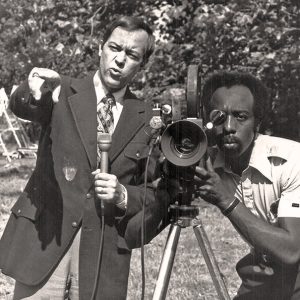calsfoundation@cals.org
Jack Edward Hill (1940–2012)
Jack Hill was a broadcast journalist and documentary filmmaker who won national awards with station KAIT in Jonesboro (Craighead County) and eventually founded his own company in Little Rock (Pulaski County) to produce some sixty long-form features.
Jack Hill was born in Rogers (Benton County), the only child of William Radus Hill and Grace Fields Hill. He attended Rogers High School, graduating in 1958 as senior class president. As a junior, in 1957, he played forward for the school’s only state champion basketball team. At the University of Arkansas (UA) in Fayetteville (Washington County), he majored in speech, participated in the Reserve Officers’ Training Corps (ROTC) program, and served as chaplain of his Sigma Alpha Epsilon fraternity chapter. After obtaining his BA in 1962 and serving a two-year stint in Germany with the U.S. Army, Hill enrolled in the MA program in journalism at the University of Missouri in Columbia, graduating in 1967 with a thesis devoted to coverage of the war in Vietnam by the national television networks.
Next came a series of short-term jobs with television stations, first in Colorado (Denver, at KLZ), followed by Mississippi (Jackson, at WJDX/WLBT), and Texas (Dallas, at WFAA). Hill’s experiences in both Denver and Dallas were brief and ended in his being fired, but in Jackson he produced his first award-winning feature. Homes Like These, an investigation of problems associated with low-income housing in Mississippi, was nominated for a 1970 Station Award by the National Academy of Television Arts and Sciences. Hill also met his future wife in Mississippi—in August 1973, he married Anne Powers, a Jackson native and Millsaps College graduate. The couple had no children.
In 1975, Hill got his big professional break, coming home to Arkansas as a reporter and news anchor at KAIT. A mostly successful decade followed, with Hill producing an impressive list of prize-winning investigative pieces with cameraman Ray Scales and becoming something of a household name at KAIT, which covered a large broadcast region that was relatively small in population. Fellow journalist Roy Ockert paid tribute to this phase of Hill’s career in an obituary notice written thirty years later: Hill, he wrote, was “Arkansas’ best and perhaps most prolific broadcast journalist for more than 35 years.” Ockert went on to note that Hill “didn’t shy away from controversial stories,” citing among his accomplishments pieces or series on slum housing in Jonesboro, railroad crossing safety issues in northeastern Arkansas generally, corruption in the sheriff’s offices of Poinsett County and St. Francis County, and the activities in Arkansas of the right-wing Posse Comitatus group.
These pieces, even as they earned regional and national awards, did not endear Hill to the powerful figures whose follies (and criminal operations) they brought to light. Pressures both economic and political were brought to bear. For example, Hill was sued by St. Francis County Sheriff Coolidge Conlee, and in 1985 Hill was once again let go (or, more precisely, offered a contract sharply restricting his investigative activities); the suit, however, was dropped when Conlee was indicted in 1988 (he died in prison in 1990).
By the end of the decade he had relocated to Little Rock and created his own production company: TeleVision for Arkansas. Over the next twenty-three years, he produced freelance documentary videos for the Arkansas Educational Television Network (AETN) and a wide range of commercial stations across Arkansas (and one in Louisiana). Most of these dealt with various topics in Arkansas history, including military history, a life-long interest of Hill’s. Representative titles include Faces Like Ours, a 2009 portrait of the 1940s prisoner-of-war camps for German and Italian POWs in Arkansas, and Wings of Honor, a 2005 feature on the World War II–era Walnut Ridge Army Flying School. He was also a Civil War buff, producing three separate films on Arkansas’s role in that conflict (War in the Delta from 1993, War in the South from 1994, and War on the Frontier from 1997 to 1998). Hill also continued to welcome controversial topics—in 1994, for example, he produced My Brother’s Keeper, an unblinking look at the ravages of AIDS in Arkansas. Other films featured additional public health issues: Children of Hunger in 1996, Survival in the Stroke Belt in 1993 (on Arkansas’s national per capita leadership in stroke-related fatalities), and Born Too Small in 1992 (on the state’s top spot in low-birth-weight babies). Hill was also an avid sports fan and Arkansas Razorbacks supporter—at least five films highlight various high school and collegiate athletic stories.
Hill died on July 12, 2012, while working on his longest film, an overarching survey of Arkansas’s role in the Civil War built upon his earlier treatments. Titled War in the 60’s, it was completed and edited by Hill’s longtime cameraman, UA journalism professor Dale Carpenter.
For additional information:
Carpenter, Dale, and Robert Cochran. Reporting for Arkansas: The Documentary Films of Jack Hill. Fayetteville: University of Arkansas Press, 2022.
Jack Hill Videos. Center for Arkansas and Regional Studies. University of Arkansas, Fayetteville. https://arkstudies.uark.edu/publications/jack-hill/videos/ (accessed September 8, 2022).
Ockert, Roy. “Jack Hill’s Work Added Greatly to Understanding of Arkansas History, Culture,” Arkansas News, July 20, 2012. https://www.arkansasnews.com/article/20120720/opinion/307209931 (accessed August 20, 2020).
Robert Cochran
University of Arkansas, Fayetteville
 Divergent Prosperity and the Arc of Reform, 1968–2022
Divergent Prosperity and the Arc of Reform, 1968–2022 Mass Media
Mass Media KAIT Personnel
KAIT Personnel 



Comments
No comments on this entry yet.